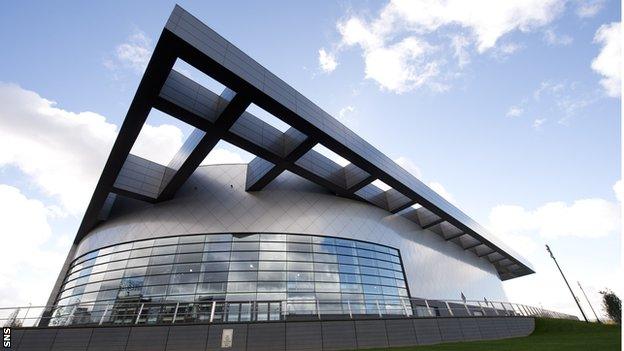Commonwealth Games preparations going according to plan
- Published

The Emirates Arena will host cycling at the 2014 commonwealth Games
Bruce Robertson, vice president and chair of the Co-ordination Commission of the Commonwealth Games Federation is in Glasgow to monitor progress for next year's games.
Robertson, from Canada, will spend four days in the city examining areas such as planning, contingency, security arrangements and communication.
"Most of the main infrastructure plans should be in place at this point of time," said Robertson.
"We make sure everything is ready."
Work at the numerous venues around the city for the 2014 Commonwealth Games is now at an advanced stage, particularly where construction is concerned, but Robertson is now concentrating on the general organisational capabilities of the Glasgow team to ensure the numerous events will run smoothly and safely.
"The last nine months are just taking care of the details," said Robertson.
"We look at venue use agreements, making sure all the venues are in place, transportation plans are in place, most of the fleet is acquired.
"It makes a big difference because then all the volunteers and staff can get into the venues and get a sense of the physical space.
"It's an ideal situation here."
The centre-piece of the Glasgow games will be the national stadium at Hampden Park, which will host the athletics and the closing ceremony, but with several football matches still to be played at the ground, contractors will not gain access to begin laying track in preparation for the main events taking place on 24 July.
However, Robertson is confident that the construction team will have plenty of time to complete the necessary modifications.
"They've got the contractor on board," said Robertson. "They have tested the concept and the international federation has signed off on it.
"Once the construction is done they'll have to test it and get the schools competition on the go later in the spring and see how the track reacts.
"In terms of the timeframe they've got access to the venue for a good period of time to make sure the construction happens. Given they have a number of months before the competition to get it done, we are pretty confident."
One of the major planning issues for the 2014 team will be the management of spectators, including security around the games venues and the hospitality for athletes who will participate in events around the various locations in the city.
Robertson believes that one of the biggest issues facing the organisers is the relative proximity of the various games locations in the city, with most of the Glasgow venues contained within a five-mile radius.
"Transportation at any games is one of the challenges," said Robertson. "From spectators to athletes they have to be taken care of.
"The city is used to having 50,000 people come to a venue but it is the number of venues in proximity that sometimes causes some challenges.
"Planning is critical and that's what we are focusing on in this trip. The design of the route network is very solid; now we have to get all the logistics of cars, drivers and timetables in place.
"There are some details to work out but that's not unusual at this point.
"We are confident that we have a very strong team."
Robertson added: "All the various modes of transport - we make sure the plans are reasonable and that the athletes aren't impacted by spectator movements.
"It's important that the public know how to get to a particular venue on a particular day for a particular event."
"It's the quality of the team that we are most impressed with. They have a good grasp of what the issues are.
"The plans are well advanced. So far, no problems but transportation is a challenge so we'll be keeping an eye on it from now until the games."
- Published29 October 2013